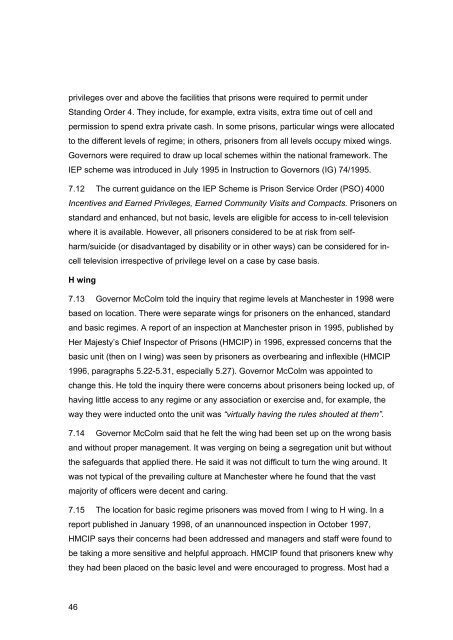Report of the Inquiry into the circumstances of the Death of Bernard ...
Report of the Inquiry into the circumstances of the Death of Bernard ...
Report of the Inquiry into the circumstances of the Death of Bernard ...
You also want an ePaper? Increase the reach of your titles
YUMPU automatically turns print PDFs into web optimized ePapers that Google loves.
privileges over and above <strong>the</strong> facilities that prisons were required to permit under<br />
Standing Order 4. They include, for example, extra visits, extra time out <strong>of</strong> cell and<br />
permission to spend extra private cash. In some prisons, particular wings were allocated<br />
to <strong>the</strong> different levels <strong>of</strong> regime; in o<strong>the</strong>rs, prisoners from all levels occupy mixed wings.<br />
Governors were required to draw up local schemes within <strong>the</strong> national framework. The<br />
IEP scheme was introduced in July 1995 in Instruction to Governors (IG) 74/1995.<br />
7.12 The current guidance on <strong>the</strong> IEP Scheme is Prison Service Order (PSO) 4000<br />
Incentives and Earned Privileges, Earned Community Visits and Compacts. Prisoners on<br />
standard and enhanced, but not basic, levels are eligible for access to in-cell television<br />
where it is available. However, all prisoners considered to be at risk from selfharm/suicide<br />
(or disadvantaged by disability or in o<strong>the</strong>r ways) can be considered for incell<br />
television irrespective <strong>of</strong> privilege level on a case by case basis.<br />
H wing<br />
7.13 Governor McColm told <strong>the</strong> inquiry that regime levels at Manchester in 1998 were<br />
based on location. There were separate wings for prisoners on <strong>the</strong> enhanced, standard<br />
and basic regimes. A report <strong>of</strong> an inspection at Manchester prison in 1995, published by<br />
Her Majesty’s Chief Inspector <strong>of</strong> Prisons (HMCIP) in 1996, expressed concerns that <strong>the</strong><br />
basic unit (<strong>the</strong>n on I wing) was seen by prisoners as overbearing and inflexible (HMCIP<br />
1996, paragraphs 5.22-5.31, especially 5.27). Governor McColm was appointed to<br />
change this. He told <strong>the</strong> inquiry <strong>the</strong>re were concerns about prisoners being locked up, <strong>of</strong><br />
having little access to any regime or any association or exercise and, for example, <strong>the</strong><br />
way <strong>the</strong>y were inducted onto <strong>the</strong> unit was “virtually having <strong>the</strong> rules shouted at <strong>the</strong>m”.<br />
7.14 Governor McColm said that he felt <strong>the</strong> wing had been set up on <strong>the</strong> wrong basis<br />
and without proper management. It was verging on being a segregation unit but without<br />
<strong>the</strong> safeguards that applied <strong>the</strong>re. He said it was not difficult to turn <strong>the</strong> wing around. It<br />
was not typical <strong>of</strong> <strong>the</strong> prevailing culture at Manchester where he found that <strong>the</strong> vast<br />
majority <strong>of</strong> <strong>of</strong>ficers were decent and caring.<br />
7.15 The location for basic regime prisoners was moved from I wing to H wing. In a<br />
report published in January 1998, <strong>of</strong> an unannounced inspection in October 1997,<br />
HMCIP says <strong>the</strong>ir concerns had been addressed and managers and staff were found to<br />
be taking a more sensitive and helpful approach. HMCIP found that prisoners knew why<br />
<strong>the</strong>y had been placed on <strong>the</strong> basic level and were encouraged to progress. Most had a<br />
46
















